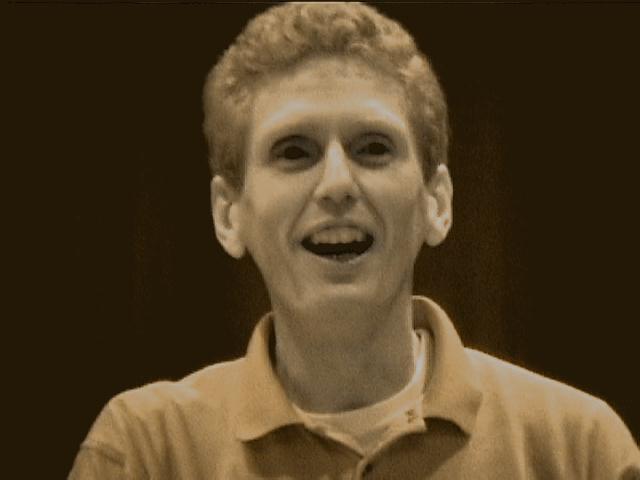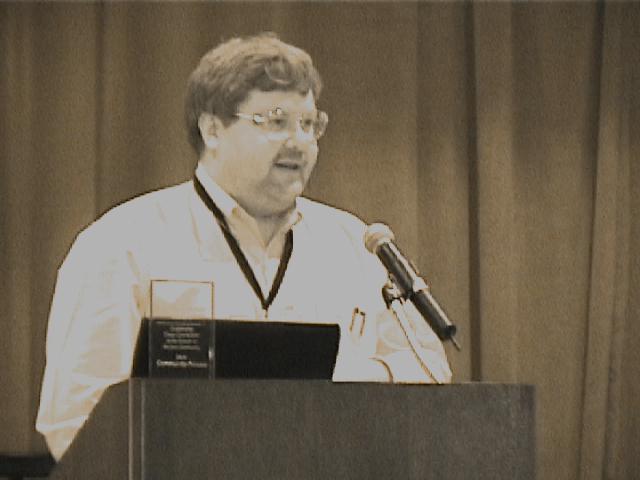by Susan Mitchell
April 2, 2002 -- JCPSM Program members have plenty to celebrate, and
celebrate they did at their posh annual members-only dinner held at
the Argent Hotel in San Francisco, near the JavaOneSM conference's
Moscone hub. In a 25% attendance upsurge from last year, over 150
JavaTM technology architects and developers arrived primed to hear
good news from the Program Management Office (PMO) and a panel of
elected Executive Committee (EC) members.
Onno Kluyt, manager of the JCP PMO, didn't disappoint. He kicked off
the event by displaying the JCP's recent award from Java Pro Magazine
for "Outstanding Contribution to the Java
 Community by a Group." JCP members are proud of their efforts to give
back to the
Java community. One member reflected their sentiments when he
commented to the assembled EC panel, "all innovation and evolution of
Java technology takes place here."
Community by a Group." JCP members are proud of their efforts to give
back to the
Java community. One member reflected their sentiments when he
commented to the assembled EC panel, "all innovation and evolution of
Java technology takes place here."
However, the main source of excitement was a Java Specification
Request (JSR) that has been in the works for nearly two years. Just
over a month from public review, JSR 99: Java Specification
Participation Agreement (JSPA) now promises to grant unprecedented
access to Java technology.
Executive Committee Makes Participation More Open and Affordable
Rob Gingell, JCP Chair and Vice President at Sun
Microsystems,  described the development of the
spec through the combined Executive Committee and
into community review. Although YES votes passed it at that point,
the EC observed that the NO votes referred to a list of issues on
the Apache Software Foundation (ASF) website.
Even the YES votes
echoed those concerns and suggested they be addressed. ASF's ability
to continue participating in the JCP "was in jeopardy," said Gingell,
and the EC has spent the last few weeks working "at a fevered pitch"
to understand, respond to,
and satisfy the needs.
described the development of the
spec through the combined Executive Committee and
into community review. Although YES votes passed it at that point,
the EC observed that the NO votes referred to a list of issues on
the Apache Software Foundation (ASF) website.
Even the YES votes
echoed those concerns and suggested they be addressed. ASF's ability
to continue participating in the JCP "was in jeopardy," said Gingell,
and the EC has spent the last few weeks working "at a fevered pitch"
to understand, respond to,
and satisfy the needs.
The JSPA is the contract that organizations agree to when they want
to join the JCP. It spells out the terms for licensing, intellectual
property (IP) issues, and so forth. Through JSR 99 and under pressure
from Apache, the JSPA is being reworked to improve the close
relationship between the JCP and the open source community. Sun has
proposed significant enhancements that expands the ability to create
open source implementations, provides no-cost access to Technology
Compatibility Kits (TCKs) for qualified non-profits, and establishes
a Sun-funded scholarship program for those who can't afford access to
Sun's TCK support services.
The result makes participation more open and affordable. JSR 99
allows for independent implementations of all JSRs, separate
licensing of Reference Implementations (RIs) and TCKs, and Open
Source license models for compatible independent implementations. Sun
no longer automatically shares the IP license; instead the spec lead
company becomes its sole owner. The EC is still considering granting
no-cost access to TCKs for non-profit efforts. If all goes well, JSR
99 should be final around August 2002.
The new rules will apply immediately to all JSRs starting after JSR
99 goes final. Sun has also pledged to apply the terms of the new
JSPA retroactively for several key JSRs. Kluyt promised the PMO would
call up all JSR spec leads to encourage
moving to the new agreement. He suggested retaining a lawyer to check
over the legal aspects of such a move.
JSR 171: JCP 2.5 implements the changes required by JSR 99, with the
combined EC again serving as the expert group. These changes are "a
substantial increment to the previous version," and they offer
members new rights and responsibilities, said Don Deutsch of Oracle.
"I can't say we got all the way there, but the majority of us
agree that it is a positive increment," he added.
ASF is not the only group that can't afford the stiff fees assessed
by Sun. Sun licenses are too high for many open source groups said
Aaron Mulder, CTO of Chariot Solutions, LLC. It's easier and cheaper
to create independent implementations than to license them from Sun.
Uncoupling RI and TCK licenses makes it more likely that small-timers
can afford one if not both.
One active participant, Gregg Orangio, vice president of New Atlanta
Communications, appreciates the changes proposed in JSR 99, but he
had to ask the EC panel what others just wondered about. If
non-profits are supported financially, what about small for-profit
companies who can't afford certification? Under JCP 2.5, all
for-profits are liable for fees regardless of their size, but Gingell
suggested approaching spec leaders directly to see if they would
arrange special pricing.
Communication is Critical
What makes the JCP work so well? "This is a robust process because of
the diversity" among members, said Gingell. The geographic diversity
among spec leads indicates the extent to which the JCP effort is an
international collaboration. 112 spec leads are from the USA, eight
from UK, six from Germany, four from India, and three or fewer come
from each of the countries of Canada, Finland, France, Ireland,
Japan, New Zealand, Sweden, and Switzerland. All of this makes
communication all the more vital and challenging.
The entire JCP approach rests on the notion that feedback is critical
to improving processes. This conviction carries through everything
the JCP does. It is most clearly seen in the way expert groups
conduct their business and in the numerous required review cycles
each specification must undergo.
The PMO thrives on input and continues to solicit comments through
the pmo@jcp.org alias. By holding three spec lead training sessions
in US and Europe, the PMO gained excellent feedback and is improving
the process to implement the suggestions.
Even the member dinner itself allotted time for the audience to
address the assembled EC panel directly. Among other topics that were
brought up, the EC seemed willing to consider that the Java 2 Micro
EditionTM (J2METM)/Java 2 Standard EditionTM (J2SETM)
division of the Executive Committee is becoming increasingly
unnecessary, that simple thumbs-up/thumbs-down EC voting may need to
give way to a system with more dialogue, and that the JCP may need to
come up with ways to effectively market the tools and opportunities
it offers. Any member can always contact EC members individually
or through the PMO. "Your voice is largely
through the EC. We love your input because we see ourselves as your
representatives," said Don Deutsch.
Among other topics that were
brought up, the EC seemed willing to consider that the Java 2 Micro
EditionTM (J2METM)/Java 2 Standard EditionTM (J2SETM)
division of the Executive Committee is becoming increasingly
unnecessary, that simple thumbs-up/thumbs-down EC voting may need to
give way to a system with more dialogue, and that the JCP may need to
come up with ways to effectively market the tools and opportunities
it offers. Any member can always contact EC members individually
or through the PMO. "Your voice is largely
through the EC. We love your input because we see ourselves as your
representatives," said Don Deutsch.
Members were urged to take the matter of EC representation seriously
by offering another kind of input in nominating new candidates and
voting in the upcoming EC election. Five rotating seats come up for
election every October.
All in all, members are pleased with the direction JCP is taking. One
member, Aaron Mulder, put this general feeling into words: "It is
fantastic that so many are able to influence the growth of Java
technology. There is good growth in lots of directions, especially in
Sun's acceptance of open source."
SEE ALSO:
ASF Position Statement
http://jakarta.apache.org/site/jspa-position.html
JCP Response to ASF
http://www.jcp.org/aboutJava/communityprocess/announce/LetterofIntent.html
JSR 99: JSPA
http://www.jcp.org/jsr/detail/99.jsp
JSR 171: JCP 2.5
http://www.jcp.org/jsr/detail/171.jsp